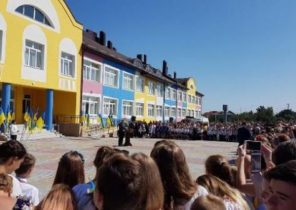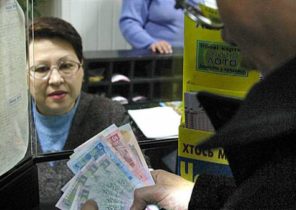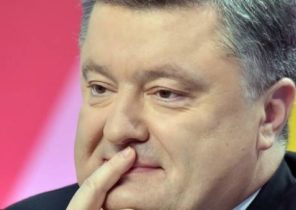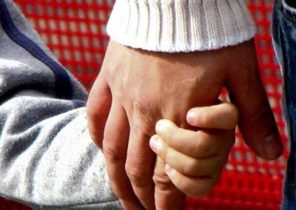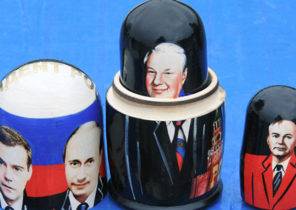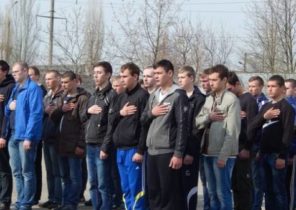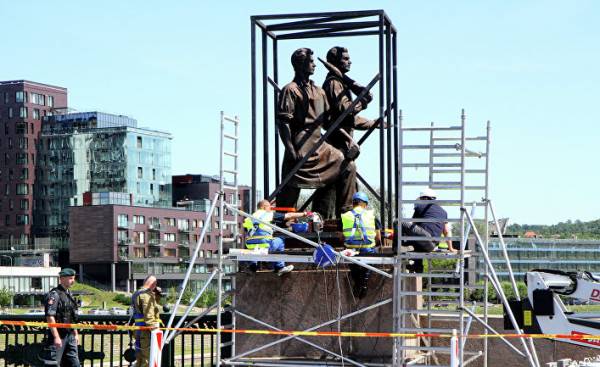
Perhaps the main ideological stumbling block that divides Russian society and the Baltic countries is the perception of the seventy-year history of the Soviet Union and the upheavals of the twentieth century. It would seem that the discourse of sacrifice and glorification of the past, is diametrically opposed to the vectors that should lead in quite different directions. But in practice things are not so simple and not so simple.
A statue of discord
21 Jul 2015 ended with the dismantling of the last elements of sculpture “On guard for peace”. Discussion about whether to stand on the famous Green bridge in Vilnius socialist realist giants, was for many years. For nearly three decades for the independence of Lithuania at the helm of Vilnius were different mayors and they ended up in different ways. But none of them was decided to remove the sculpture, despite the obvious anti-Soviet tendencies in society. It is difficult to say why this did not happen — it would seem that this was to be the final and loudest chord of de-Sovietization of Lithuania.
But took it, oddly enough, the politician of a new type — the young and the pragmatic mayor Remigijus Šimašius. “This song 8 people on the bridge, has always been ambiguous,” says Šimašius. The mayor does not hide the irony: he already got used that Russian journalists are always asking about completed sculptures. But Simasius, it seems that this story is not badly hurt, and about his decision he says, as some kind of technical situation is almost devoid of the symbolic component.
“Sculpture of the red army caused negative feelings among the citizens, were perceived as the troops of the occupying army. For twenty years many times discussed why they are still there and aggressive Putin’s policy in other countries has provoked much discussion, — said Šimašius. And then it was decided to remove these sculptures for two reasons: they do not cause positive feelings, and are associated with the occupation of Lithuania, the people that actually are not happy. These sculptures were in critical condition, you need to invest in their recovery, and it is a waste of taxpayers ‘ money. It was decided to remove the sculptures from the bridge, now it is easier”.
Šimašius says he was surprised how quietly dismantling: the mayor was ready for everything — to pickets, demonstrations. But, according to him, in the end there were only two unhappy, which, by the way, was pretty drunk. For Simasius it was not an act of resistance to the Soviet past, he talks about this story about as well as about other problems like lack of kindergartens and problems with dilapidated housing stock.
“Question — where de-Sovietization, and where to move forward? Here, for example, the cemetery of Soviet soldiers in the centre of the city. In our country it is not customary to bury people in such places, and there is the question of reburial. This is a sensitive issue,” — said the mayor. According to him, he did not thought in such categories as de-Sovietization, and that word is actualized in his life due to the Ukrainian context — there is just demolished monuments to Lenin and other Soviet relics. By the way, Šimašius takes it in his stride and believes that it is “quite natural”.
He believes that Russia’s policy is built on the Imperial and Soviet past, so the stone gun does not discord with the Russian cultural environment, and the Ukraine has already begun another story. The mayor Šimašius is an obvious optimist, or at least wants to appear as such. He genuinely enjoys the fact that Vilnius was named the most happy European city, and says that life is changing, young Lithuanians went beyond binaries “Soviet Soviet-not”. Now they have obselescence categories and values. And dismantled fragments of the Soviet past place in any Museum, for example, in the Grutsky Park — a large reserve of stone-Stalin, Lenin, and other dubious characters of the history of the twentieth century.
A straight line
Despite the very pragmatic approach to the traces of the Soviet presence, marked On the Šimašius, not all as calmly perceive the work with symbolic codes and the past. One of the biggest surprises for me was how strongly expressed the discourse of victimization in the Baltic States. If trauma has become a major consolidating factor, around which are arranged the social system. And I must say that in sociology it is often said about such phenomena. Trauma can indeed work as an Assembly point and method of determination. That’s just sociologists say that the Western and Eastern countries differ in experiencing injury, and not everywhere it works in the creative way. And if Germany or the US, for example, was able to find a way to turn their traumatic past of his own self, the Eastern countries often have trouble with that.
Algimantas Kasparavicius, historian and political scientist, says that the theme of Soviet trauma and the subsequent de-Sovietization is still quite sensitive. According to him, this is largely due to the fact that people who were fellow travelers of the Soviet regime, and later rebuilt and became an ardent patriot and nationalist, in Lithuania still abound.
“The most striking example — the Justinas, Marcinkevicius, a famous Lithuanian writer. In Soviet times, he was a famous poet and member of the Communist party. But he actively participated in the restoration of Lithuanian statehood. Our society thinks and can not decide where to ascribe to the collaborators or patriots. But that’s not the problem of the poet, and the problem of part of Lithuanian society, which can not be determined. By and large, they understand that it is not fought against the Soviet regime, but just went with the flow. And when the regime began to fall apart, and everything was possible they remembered that they were Lithuanians, nationalists, patriots. And they become what they are today,” says Kasparavicius.
According to Kasparavicius, c Lithuanian historical science the same as in the rest of the world — she is actively intertwined with propaganda and becomes its tool. “After the events in Ukraine, we often advocate that in Lithuania lined up very clear clear narrative of Lithuanian history. Do not say, but according to the pattern which is built in Russia. says Kasparavicius, In Lithuania some circles of politicians and historians, slip into ideology, require a normal clear simple narrative about what good was the Duchy of Lithuania, and how scary the bear was Grand Duchy of Moscow, which began to put pressure on Lithuania. The problem is that if you look globally, due to the fact that we are neighbours, living side by side for a thousand years almost, we are very similar in thinking, in the structure of behavior. But in nature often found that are similar often don’t like each other, because one suspects that another takes its place. On a global scale and in Lithuania, Russia and Poland are the European civilization. But in the beginning of the XXI century we are not looking for what unites us, and that we are rejects from each other. In Russian historical science are looking for, how many Balts participated in the Holocaust, how they behaved treacherously, call rascals our forest brothers. We aren’t in debt and doing the same thing and throw in the eyes of the current official historical science that you have not been freed from the Nazi yoke, and occupied. Probably the first liberated, then occupied, but this place we skip and move on. But the principle is the same — we are searching for something to say that we don’t like you”.
The acquisition of subjectivity
In conversations about the occupation with the Nazis, then the Communists there is always one very strange point is the loss of subjectivity. If the very process of history was the driving force, and the people, society and the country was just his objects. This approach is certainly possible, however it’s like he’s forgetting something really important and valuable thing in people. In the Lithuanian historical science already written enough works about the Soviet occupation and collectivization. But on how we lived the Lithuanians during the German occupation, the debate is often linked to academic offices. Public consensus was that we are the victims, and nothing more.
But in 2015 the situation is fundamentally changed. In General, shifts were scheduled after the accession of Lithuania to the European Union. However, fully proved to the world they recently. And one of the most striking examples is the memorial procession in the city of molėtai, dedicated to the murdered during the German occupation the Jews. It was organized by Marius, Ivaskevicius, a native of this town and one of the most famous Lithuanian playwrights. “I have this topic the greater part of his life was not engaged and was just as indifferent as many while this information and the scale is not fully realized to me. Not just rationally, but emotionally, says Ivaskevicius — When you realize that rose in the place where two thousand people killed not so long ago, the same citizens as you are. I, like everyone, knew about it, but sketchy, not fully. But when I studied this story, I shook first, the very fact of its existence, and then the respect of my town to it. Formal. I read about it first in the book, then found the grave — it was a little square of the Soviet times with a stone on which was the star of David and a sign: here killed 700 people. He looked formal, unkempt — it gave me mixed feelings, shame. I then lit up the idea with the help of our local businessmen to do something to this place touched emotionally to the inhabitants of the town knew about it. Because this is the spot. It is a great crime and shame, which no nation can accept this can’t — continues, Ivaskevicius. For Western countries, Germany and France, it also took effort and long work, has not yet been taken and said that our people also participated in this crime. I realized that a lot of people we have living in such intentional or unintentional ignorance. We know that was a tragedy, but may not be to kill the Lithuanians, were killed after the Nazis. It’s not easy — we see the example of Russia, where this does not work, or Vice versa, the work is going to forget it or to make heroes of the butchers. The people of this rosy takes. Probably because repentance is the most difficult thing to do, to say that our forefathers were criminals.”
The development of this story was quite unexpected. Ivashkevichus, almost single-handedly was able to convince local authorities to cooperate, organized a broadcast on national television, was able to gather several thousand people at the March, which many still remember as the incredible and very important experience. It turned out that the efforts of one enterprising person sometimes enough to change something in the minds of many. “In order to recognize himself as a victim, do not need much effort. Being a victim — there’s not much to admit. You’re right. To be on the right side easily. But on the side of wrong is hard,” says Ivashkevichus. He says that to make this information even more difficult due to the fact that the share of Lithuanians fell so many trials, repression and murder. But to speak on such topics freely became technically possible only recently. “I think the younger generation is tired to be victims. It is more common in those who lived in those times. These topics were too many, there was a glut. The young want to live in a free world without getting sick these diseases of their fathers and grandfathers. The younger generation is ready to accept that we are not only victims, because they do not have this hump. As Tolstoy said, the man is like a river, it changes all the time. If a man was indifferent a week ago, it does not mean that it will be life.”
